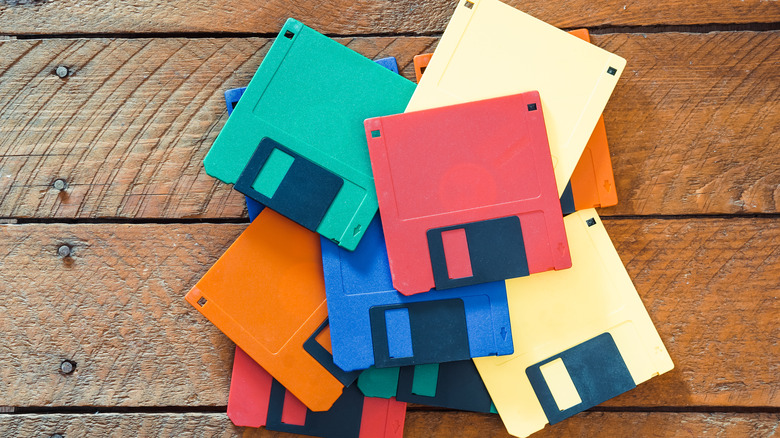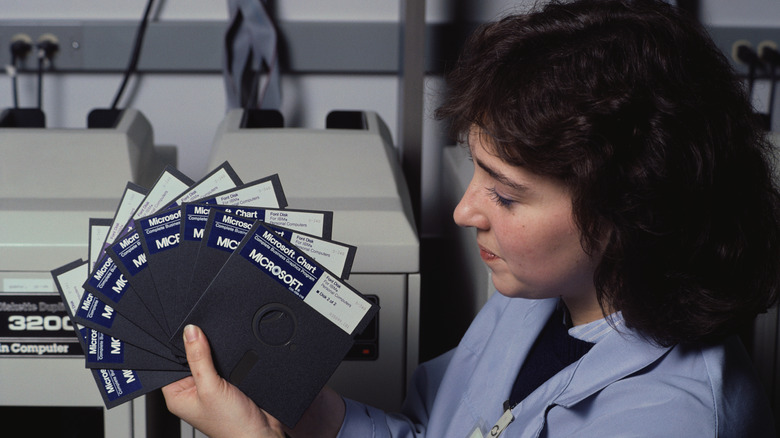
When talking about vintage tech from the ’90s, it’s common for millennials to bring up the Walkman, Tamagotchi, Polaroid cameras, and CDs. All of these died out and then saw a recent resurgence — save for CDs, which never really went away and are still largely used by the music industry. One piece of ’90s tech that has seemingly been forgotten and never returned, though, is the floppy disk. Although it still holds on as the standard icon for the “Save” function in computers and apps, nothing much has been said about this physical storage format in both mainstream and alternative media in recent years. And this is likely because the floppy disk is now considered a relic of the past.
Interestingly, though floppy disks are obsolete in modern computing, they remain in use in some niches. Hence, we can’t really consider them dead, especially when very important industries still rely on them for official storage use. One industry that continues to utilize floppy disks is the aviation industry. The Federal Aviation Administration (FAA) still uses floppy disks to manage flight and air traffic data. The reason why many airports in the country still use floppy disks is that the entire infrastructure of air traffic control systems was developed in the 1990s, and at the time, floppy disks were the standard storage format for computers. However, amid concerns about how the outdated format affects the safety and efficiency of modern air travel, the FAA is working to eliminate the dated tech soon.
also:A1540 Charger for Apple Macbook 12″ A1534 USB-C
Other industries that still use the floppy disk
Aside from the FAA, other important industries still use the seemingly dead floppy disk for data storage. The medical sector continues to rely on floppy disks to store patient records and other medical data. Doctors in Norway reportedly used the dated storage format to receive monthly updates to their patient lists as recently as 2015. The Norwegian government even handed out diskettes to medical professionals each month for this purpose. As to why the medical profession still preferred floppy disks, Norwegian software developer Finn Gundersen explained it in a 2015 blog post: “[F]loppy disks are inexpensive; they cost far less than a USB drive and are far less time-consuming to write to than a CD-ROM for this amount of data. Given the historical restriction of delivery by mail, and the data volume being less than 1.44MB, they are the logical choice.”
Some train systems also remain loyal to floppy disks. The Muni Metro light railway in San Francisco, for instance, still requires a diskette to boot up its Automatic Train Control System every morning. However, there’s word that a project to replace the system is underway, so the railway is expected to bid farewell to the physical floppy disk by 2033. Meanwhile, some textile factories also utilize floppy disks to run their older machines. According to textile expert Matthew Hollinshead, they are unlikely to change out their older input system for fear that newer storage formats could introduce bugs and cause issues with their machinery.
also:815049-001 Charger for HP Elite x2 45W USB-C
Are floppy disks still in production?

Although floppy disks are still used by different industries, including some music labels with unique marketing campaigns, the days of this antiquated technology are numbered. Some industries are wedded to floppy disks because their legacy systems only work with the format. Once they begin replacing their old computers and machinery with newer systems, they will likely move on from diskettes and start using more modern alternatives. They may also be forced to get rid of their legacy systems once the remaining supply of floppy disks runs out. The last major manufacturer of diskettes officially stopped production in 2010. Everything that is in circulation is either a product of the final output or recycled disks.
Tom Persky, the owner of floppydisk.com, a company that sells and recycles floppy disks, said in 2022 that he’s the “last man standing in the floppy disk business.” At the time, he shared that he had half a million floppy disks in 3.5-inch, 5.25-inch, and 8-inch sizes in stock. However, he was also receiving up to 1,000 pre-owned and new disks a day from people sending diskettes in for recycling. He hasn’t released any updates about his inventory since, but his website continues to sell both new and used disks in bulk. While Persky has been supplying floppy disks to multiple industries with dated equipment and computers, he admitted that many hobbyists also buy diskettes from his website. It’s unclear how long his supply will last.